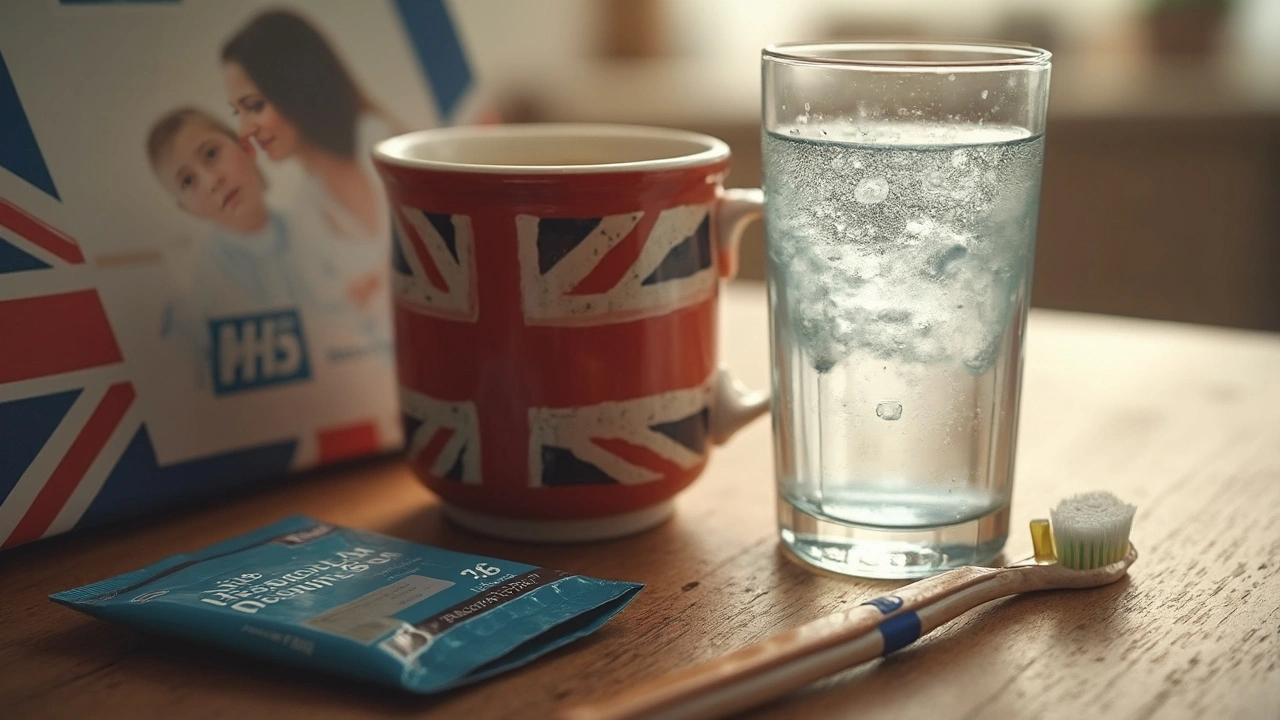Fluoride isn’t just some chemical your dentist talks about to scare you into brushing your teeth. It acts like a secret weapon for fighting off cavities by making your tooth enamel tougher. If you’ve ever wondered why dentists care so much about fluoride, here’s the deal: it helps repair little bits of early tooth damage and shields your teeth from bacteria that cause decay.
If you live in a place where the tap water doesn’t have added fluoride, your teeth might be missing out. Even that fancy natural spring water most people love often skips the fluoride part. If you’re not getting enough from water or toothpaste, adding a fluoride supplement could give your mouth a serious upgrade, especially for growing kids or anyone catching cavities like Pokémon.
- What Exactly Does Fluoride Do?
- Who Actually Needs a Fluoride Supplement?
- Everyday Ways to Get Your Fluoride Fix
- Tips and Warnings: Getting It Right
What Exactly Does Fluoride Do?
If you want to know why fluoride matters for oral health, here’s the meat of it: fluoride bonds to your tooth enamel and makes it much tougher. When you eat or drink sugar, bacteria in your mouth create acids that attack your teeth. Fluoride steps in like a bodyguard, helping your enamel re-harden before those acids do any major damage.
That’s not all. Fluoride can even help reverse very early signs of tooth decay. The process is called remineralization. Basically, fluoride pulls minerals like calcium and phosphate back into your teeth, patching up the tiny spots before they turn into actual cavities. Mouth’s version of fixing a pothole before it becomes a sinkhole.
Get this—studies reviewed by the CDC show that people who brush twice a day with fluoride toothpaste cut their risk of cavities by up to 40%. Here’s a quick snapshot that compares fluoride’s effect on cavities:
| Group | Cavity Risk |
|---|---|
| No fluoride | High |
| Fluoride toothpaste | Moderate |
| Fluoride supplement + toothpaste | Lowest |
If you’re prone to cavities, have dry mouth, or use braces, you’re at even bigger risk—and that’s when fluoride helps most. Even adults can see results, not just kids. So, whether you’re sipping water, chewing gum, or using a fluoride supplement, you’re giving your teeth what they need to stay strong and cavity-free.
Who Actually Needs a Fluoride Supplement?
Not everyone needs to pop a fluoride supplement with their morning vitamins. Most folks get a decent amount just from drinking water or using a standard toothpaste. But if your water isn’t treated with fluoride—and more than 30% of U.S. households fit this bill—you could be missing out, especially if your diet skips processed foods (which sometimes use fluoridated water during production).
Kiddos are a big focus here. Kids between six months and sixteen years are growing their “forever” teeth, and that’s when dental care really counts. If home water tests show less than 0.6 parts per million (ppm) of fluoride, kids are strong candidates for supplements. Dentists or pediatricians usually point this out during a check-up. Growing teenagers with braces or special dental needs might also get a nudge from their dentist.
Adults aren’t totally off the hook. Anyone with a history of frequent tooth decay, dry mouth (from meds or health problems), or who needs extra help because of disabilities can benefit. The same goes if you use bottled or filtered water with little to no fluoride (and most home filters strip it out completely).
- Young children (6 months–16 years): Especially if tap water has less than 0.6 ppm fluoride
- Adults with frequent dental problems: Lots of cavities or gum disease? Ask your dentist.
- People most using bottled or filtered water: Most filters take out nearly all of the good stuff
- Those with dry mouth: Conditions or meds that reduce saliva make decay easier
Just a heads-up, too much of a good thing is actually a thing. Always check with your dentist before starting a supplement. And if you want a quick look at who’s falling short, check out this data from the Centers for Disease Control and Prevention:
| Population Group | Percentage Using Fluoridated Water |
|---|---|
| Children (Ages 6-16) | 65% |
| Adults | 72% |
| Rural Households | 54% |
It’s a surprisingly common gap in people’s oral health routines—so if you fit one of these groups, it’s worth asking your dentist if you should get a boost.

Everyday Ways to Get Your Fluoride Fix
You don’t need a science degree to boost your fluoride intake. Some ways are so basic you’re probably doing them already. The first step? Grab that fluoride toothpaste every day. Most brands have the right dose baked in—just make sure the label actually says “fluoride.” Don’t be fooled by the all-natural stuff that skips it, though. Your teeth need that fight against tooth decay.
If your area adds fluoride to the tap water, you’re set. Around 210 million Americans drink fluoridated water, which cuts down cavities by about 25% in kids and adults. But if you mostly drink bottled or filtered water, you’re likely missing this benefit. Check if your filter strips out fluoride; lots of popular brands do.
- Use mouthwash with fluoride — Rinse for a minute after brushing. It helps reach areas your brush might skip.
- Eat foods with fluoride — Some tea leaves, crab, and shrimp soak up natural fluoride. Not enough to replace toothpaste, but every bit helps.
- Ask your dentist about treatments — Professional gels or varnishes give a heavy dose, great for folks prone to cavities or with weak enamel.
Supplements make sense if you’re low on all these. They come as drops, tablets, or lozenges, but you need a prescription. Don’t self-diagnose; too much fluoride can lead to stains or health issues, especially for little kids.
| Way to Get Fluoride | Typical Amount (mg) |
|---|---|
| Fluoridated Water (1 liter) | ~0.7 |
| Fluoride Toothpaste (pea-size) | ~0.25 |
| Professional Dental Varnish | 22.6 (applied 2-4x/year) |
| Fluoride Supplement (as prescribed) | Varies (0.25-1.0) |
Mix and match these options depending on where you live and what your habits look like. Your oral health gets a real leg up, without adding much effort to your day.
Tips and Warnings: Getting It Right
Getting your fluoride levels right sounds simple, but slip-ups happen. Too little and you’re more likely to get cavities, too much and you could end up with fluorosis (those strange white spots that show up on teeth, especially in kids). Moderation is the name of the game.
If you’re considering a fluoride supplement, make sure to talk to your dentist or main doc first—they know if you really need it. Kids under six are especially sensitive since their teeth are still forming. Some towns add fluoride to the water, some don’t, and bottled water rarely gives enough. Here’s a quick tip—if you always drink bottled water, double-check what’s in it, or you might be missing this key part of oral health.
"The optimal fluoride intake for most people to avoid cavities is about 0.05 mg per kilogram of body weight per day," says the American Dental Association. "But before starting any supplement, check your water supply and talk with your dental professional."
Don’t forget the basics: use a toothpaste with fluoride and brush twice a day. Swishing and spitting out toothpaste rather than swallowing is important, especially for kids. Here’s a straightforward checklist to stay on track:
- Check if your drinking water is fluoridated (local water report or city website)
- Ask your dentist before grabbing any fluoride tablets, mouth rinses, or drops
- Stick with pea-sized toothpaste for kids—no need for a giant glob
- Store supplements out of reach from kids (they’re not candy!)
- If you see white or brown stains on teeth, talk to your dentist—could be a sign of too much fluoride
A 2024 CDC review showed that communities with optimal fluoride in water see around 25% fewer cavities in kids and teens compared to areas without it, so this isn’t just old-school advice. The main point? Don’t guess. Check what you’re already getting, then fill in the gaps—no more, no less. Your teeth will thank you, and so will your wallet the next time you skip a dentist bill.


Write a comment